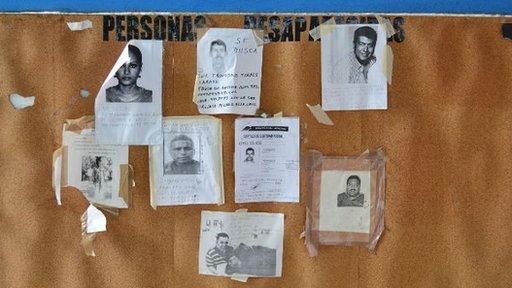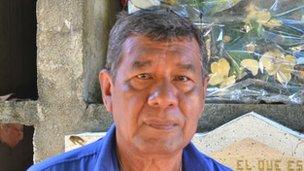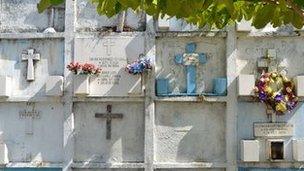Searching for Mexico's drug war 'disappeared'
- Published

Photos of missing people on a wall outside the mortuary in Acapulco
With thousands of people missing after six years of murderous violence linked to Mexico's drugs cartels, families say they want more done to find their loved ones.
It was a warm night in the Mexican border city of Ciudad Juarez and heavily armed troops were patrolling the streets, at the height of the war on drug cartels here.
Victor Baca, 21, had just dropped his girlfriend at her home and was buying a hot dog with two friends at a fast food stand.
Suddenly, and apparently without reason, troops approached the three young men, arrested them and drove them away.
That was three years ago - and the last time Mr Baca's family ever saw him.
"We think that part of the reason the military gave him a hard time was because he wasn't identified," says his father Gerardo Baca, explaining that his son may have forgotten his ID before going out that night.
"We didn't know they were arrested until the next day, when one of his arrested friends was sent to the state police," he added.
"We have no idea of the whereabouts of my son."
The fate of Victor Baca is one that is shared by many people in Mexico, where fighting between rival drug cartels and the military crackdown in response has seen an estimated 60,000 people killed in six years.

Luis Aredondo is the administrator of Palmar Cemetery in Acapulco
According to figures released earlier this year by Mexico's National Human Rights Commission, 16,000 bodies remain unidentified and a total of 24,000 people are missing, external
At the top of a hill in the city, beyond the rows of graves covered in floral tributes, lies an area of wasteland that has to be disturbed regularly by gravediggers.
"Yesterday the mortuary sent 12 bodies to us as they were not identified," says Luis Arredondo who runs the cemetery.
"They send us 10 to 12 bodies every three months and then they are buried here, in an area of 2,000 sq m."
These are the unknown victims of Mexico's drug wars - people who'll get no funeral, have no gravestone and who will, after a year, be buried in a mass grave. At this site alone the bodies of 600 unidentified people are buried.
For one observer of the crimes carried out in the fight for lucrative drug supply routes into the US, the numbers of those missing may be an underestimate.
Professor Monica Serrano from the Colegio de Mexico, a university in Mexico City, says the cartels' use of threats and extortion to boost funds is forcing people to leave their homes and in many cases make themselves "disappear".
Countering corruption
"In (the state of) Guerrero what we've seen is partly these movements which are the direct results of threats," she explains, adding that some figures suggest up to 400,000 people across the country may have been forced to uproot in this way.
"This is not yet being documented - we are just coming to terms with what is likely to become a major feature of the current violence."
It is difficult to determine the full extent of people going missing because of corruption among police officers and troops, according human rights observers and families of those missing.
Mexico's ambassador to the UK acknowledges the problem but says the government has invested in "institution building" and is boosting the numbers of police.

Graves in the cemetery in Acapulco. 24,000 people remain missing in Mexico
"We are looking at this in a very serious manner," says Eduardo Medina Mora Icaza.
"We have to build up the capabilities of the police to investigate and the justice system to process (the criminals).
He admits that corruption "is a problem, wherever you find it" but says the government has been building up larger federal and state police forces.
"Of course every single case is important and every single case shall be treated as important," he says.
"You have to build up the capabilities to deal with that."
For the parents of Victor Baca there is still hope that their son will return - and they have a simple motive to keep urging the authorities to deal with their case, despite the risks.
"It is love," says Gerardo Baca, "love of father and love of mother for our son."